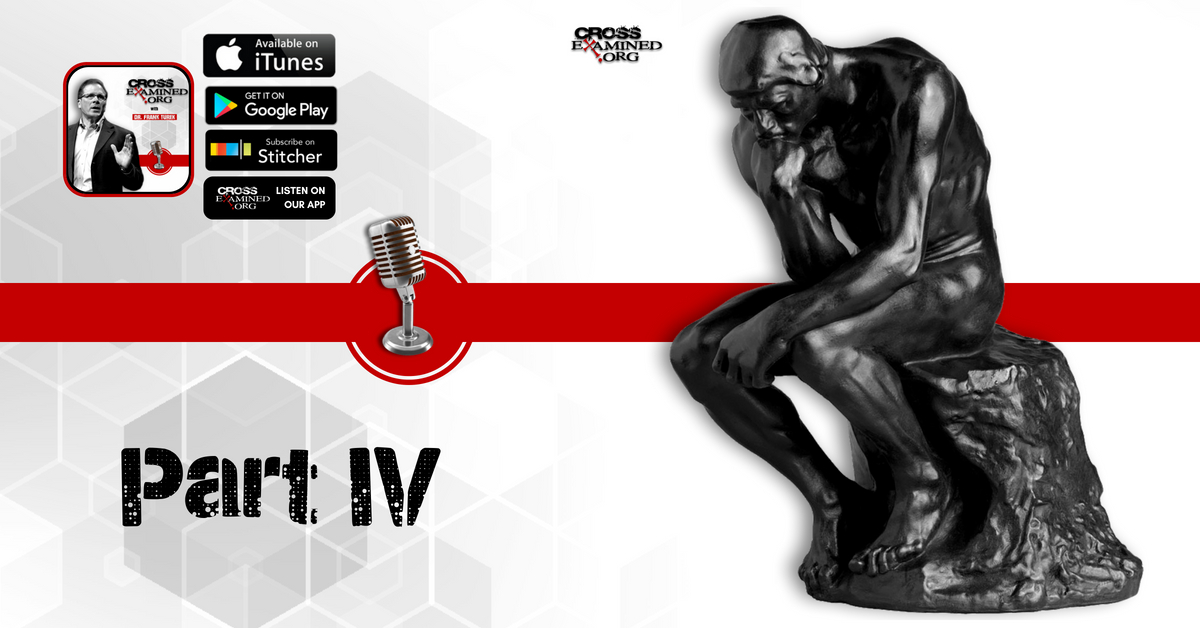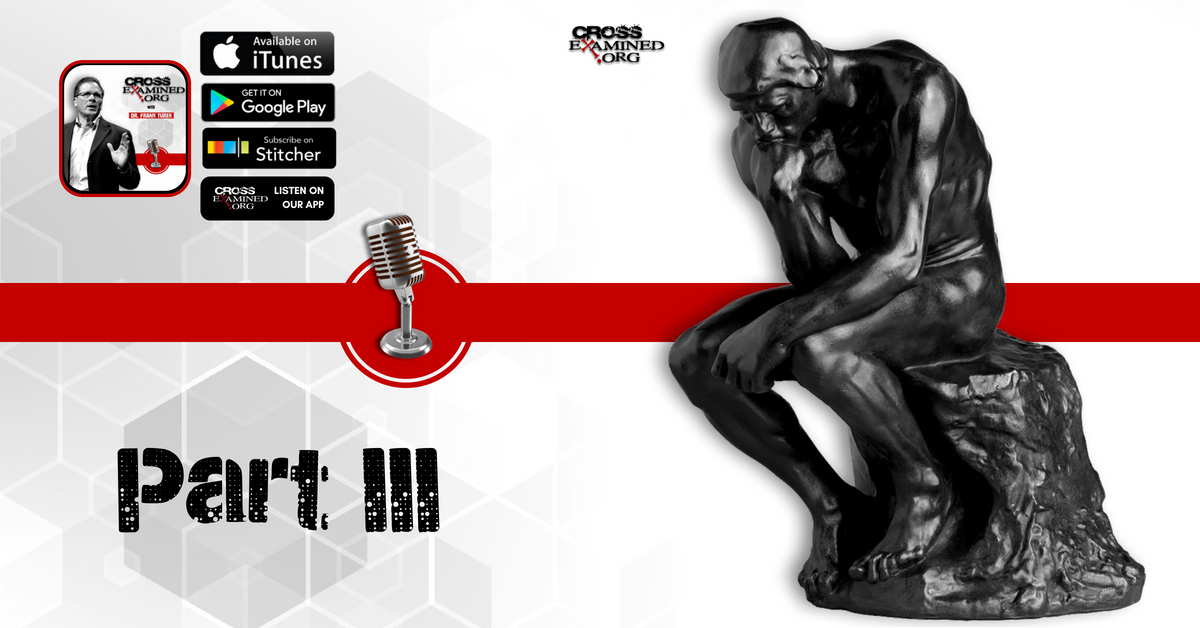By Brian Chilton
After Bible study, one evening, a good friend of mine and I discussed the problem of evil. He asked an excellent question, “Did God create evil?” I said, “No, I don’t think he did.” However, my friend objected because he said, “God created everything, so he must have created evil.” This conversation was quite good, and we found common ground by the end of our discussion. This article relates some of the issues that we discussed.
One of the first issues we needed to define was the nature of evil. What do we mean when we say something is evil? He was using the term to define any type of disaster or bad thing. I was using to term to define immoral behaviors, such as torturing babies. How do we answer this question? Did God create evil? In this article, I would like to look at four common tricky areas that need to be dissected in order to answer the question.
Ontology and Epistemology of God and Evil. The terms ontology and epistemology are philosophical terms but are important to this area of conversation. One cannot neglect philosophy because bad philosophy often leads to bad theology. First, let me define the terms and how they play a role in this discussion.
Ontology is the study of the nature of being. It deals with how we know something exists. For instance, does a pizza exist? How do we know a pizza exists? These are ontological questions that deal with the nature of pizza’s existence. And oh, how tragic life would be without the existence of pizza!
Epistemology deals with the theory of knowledge[1]. This area deals with how we know something to be true. What is the nature of such and such? To use our illustration of pizza, ontology would ask, “Does pizza exist?” whereas epistemology would ask, “Is pizza good? Can we know that pizza is tasty?” So, a created thing would deal with the area of ontology, whereas the nature of the thing would deal more in the area of epistemology more or less.
When we talk about God creating all things, we must understand that God created everything that exists including the potentials to do certain things. However, if we grant the existence of human freedom, then God is not responsible for the actions that people take. Yes, God provides the means and conditions that can lead to a person’s actions and God knows the free actions that a person will take, but the person is responsible for his or her own actions[2]. Therefore, God created all things and created the conditions where a person could do good or evil. But, God did not create evil, because evil is not a thing to be created. It is not like a virus or slab of concrete. Evil is an attribute. It is a personal rejection of the good, the good which is an attribute of God.
The Moral Character of God. God is thoroughly identified in the Scriptures as being the ultimate good. John tells us that God is love (1 Jn. 4:8). Scripture also indicates that God is absolutely holy, which means that he is set apart and absolutely pure (1 Sam. 2:2; 6:20; Ps. 99:9; 1 Cor. 3:17; Rev. 4:8). Since God is the absolute good and absolutely pure, it is false to claim that God does evil. James says that “No one undergoing a trial should say, ‘I am being tempted by God,’ since God is not tempted by evil, and he himself does not tempt anyone. But each person is tempted when he is drawn away and enticed by his own evil desire. Then after desire has conceived, it gives birth to sin, and when sin is fully grown, it gives birth to death” (Jms. 1:13-15). James answers the question for us in great detail about God’s relationship to evil. God cannot do evil because God is the absolute good[3].
So, how do we know what is evil and what is good? If you are driving down a highway, you will see a sign that posts the speed limit. In town, the speed limit will most likely be 35 miles per hour. How do you know that you’re breaking the speed limit driving 55 miles per area in that zone unless there is a speed limit posted stating that one should only go 35 miles per hour? The law must exist before you can know if you’re breaking the law. Moral standards must exist before one can know that he or she is doing evil. Objective moral standards come from God. Again, evil is not something to be created. Evil stems from a rejection of God’s moral goodness.
Ra’ah, Disaster, and Evil. Let’s face it. Biblical interpretation is tough especially when it comes to the original languages. Some individuals have spent their entire lives seeking to master the biblical languages but are still left with questions. If that is the case, should those of us with less training in the biblical languages not have much more humility when it comes to such terms? I think so.
Often, Hebrew words can take several different meanings depending on context. I remember when taking Greek that Dr. Chad Thornhill would often emphasize context, context, context when interpreting a confusing term. In Hebrew, one such example is the confusion that occurs with the term ra’ah. Ra’ah describes a disaster, but it can also be used to describe something evil. Ingrid Faro explains with the following:
“For example, the Hebrew root “evil” (ra’; ra’ah; r’ ’) occurs 46 times in Genesis and is rightly translated into English using at least 20 different words, and nuanced in the Septuagint by using eight Greek forms (11 lexemes). Yet English-speaking people often incorrectly assume an underlying meaning of “sinister, moral wrong” and interject that into each use of the Hebrew word.”[4]
In Amos 5:3, it is noted that “If this is a judgment announcement against the rich, then the Hebrew phrase עֵת רָעָה (’et ra’ah) must be translated, “[a] disastrous time.” See G. V. Smith, Amos, 170.”[5] Thus, the term ra’ah can indicate a disaster that has befallen a group of people and does not necessarily mean “evil” as some older translations have indicated.
But, doesn’t disaster indicate something evil? If God brings disaster, does that not indicate that God does something evil? No, not at all! God is holy. If a people are unrepentant and are unwilling to stop doing evil, then God is completely justified in bringing judgment. The disaster is not evil if it is due to justice. Like a parent disciplining a child or a judge executing judgment against a convicted criminal, disasters are sometimes the judgment of God poured out upon an unrepentant people. I think it was good that the Allies stormed into Germany to overtake the evil Adolf Hitler. Likewise, it is actually good for God to bring judgment as it coincides with his holy nature.
Evil Allowed to Permit the Ultimate Good. So, the final question that must be tackled is this: If God is good, then why would he allow evil to exist in the first place? Why would he create a condition where evil could exist? The answer to this is quite simple. God’s allowance of evil is to allow a greater good. What is that greater good? Love. For love to truly exist, it must be free. It must be freely given, freely received, and reciprocal between both parties. God could have created us as robots or automatons. But, that would not provide true love. The ultimate love was given in Jesus, who experienced the horrors of torture and experienced the just punishment that we deserve. He did so that we would have life eternally. The penalty of our eternal punishment was paid on the cross at Calvary. God lovingly confers his grace to all who would willingly receive. His grace is freely offered and is freely received. This kind of love would not be possible if God did not allow the conditions that would allow evil to exist. A greater good has come. One day, those who have trusted Christ for their salvation will no longer need to worry about evil because evil will be vanquished. The redeemed of Christ will be transformed. We will experience the bliss and glory of the heaven that awaits us. To God be the glory!
So, did God create evil? It depends on what you mean. God created the conditions for evil to exist but did so to allow a greater good which is the free love that is experienced between the Lover (God), the beloved (us), and the spirit of love between the two. Evil is not a thing to be created. Rather, it is a condition that exists when a person or group of people reject God’s goodness and his holy moral nature.
Notes
[1] “Epistemology is the discipline that deals with the theory of knowledge. The term can be broken down into epistem-ology (Gk. episteme, “to know; logos, “study”). It is the study of how we know.”[1] Norman L. Geisler, “Epistemology,” Baker Encyclopedia of Christian Apologetics, Baker Reference Library (Grand Rapids, MI: Baker Books, 1999), 215.
[2] In Ezekiel, God notes that each person is responsible for his or her own actions. “But suppose the man has a violent son, who sheds blood and does any of these things, though the father has done none of them… [The son] will not live! Since he has committed all these detestable acts, he will certainly die. His death will be his own fault” (Eze. 18:10-11,13). It is true that God has control over history and the like. But remember, a person is responsible for his or her actions. God’s sovereignty does not negate human responsibility. God does not force a person to do anything. His Spirit may woo a person to receive his salvation, but he will not force a person to do so. Unless otherwise noted all quoted Scripture comes from the Christian Standard Bible (Nashville: Holman, 2017).
[3] The Bible makes clear that God cannot operate in a manner that betrays his moral nature. For instance, Paul writes, “God, who cannot lie, promised before time began” (Ti. 1:2).
[4] Ingrid Faro, “Semantics,” ed. John D. Barry et al., The Lexham Bible Dictionary (Bellingham, WA: Lexham Press, 2016).
[5] Biblical Studies Press, The NET Bible First Edition Notes (Biblical Studies Press, 2006), Am 5:13.
Brian G. Chilton is the founder of BellatorChristi.com and is the host of The Bellator Christi Podcast. He received his Master of Divinity in Theology from Liberty University (with high distinction); his Bachelor of Science in Religious Studies and Philosophy from Gardner-Webb University (with honors); and received certification in Christian Apologetics from Biola University. Brian is currently enrolled in the Ph.D. program in Theology and Apologetics at Liberty University. Brian has been in the ministry for over 15 years and serves as a pastor in northwestern North Carolina.
Original Blog Source: http://bit.ly/2KDrafD










